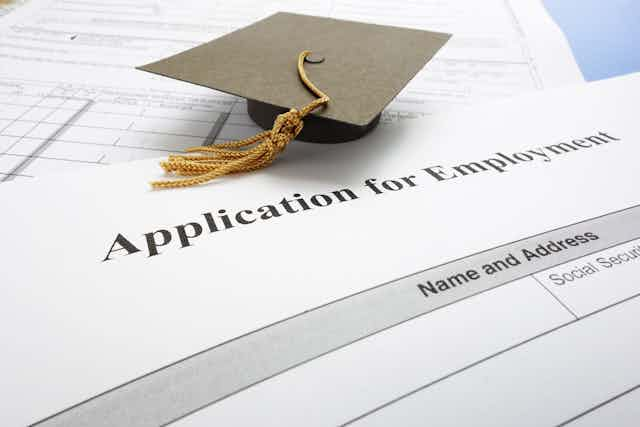Times are tough for young Australians. The costs of education and housing are rising. The youth unemployment rate is double the national average and competition for good jobs is intense.
Many young people are taking longer to reach the conventional milestones of adulthood: independent housing, career stability, a partner and children. This is not because young people no longer want these things, but because they have become harder to attain.
Degrees of importance
A university education is often seen as a reliable pathway to a good career and a comfortable life, but this pathway also seems to be crumbling with ongoing weakness in the job market.
Graduate Careers Australia runs a large, annual survey of new graduates to track what happens to them after university. Over 100,000 graduates took part in the 2014 survey and the results were released last week.
The headline-grabbing figure was that only 68% of bachelor graduates from the class of 2014 had a full-time job four months after graduating. That is the lowest full-time employment rate for new graduates since Graduate Careers Australia began measuring in 1982. The long-term average for the past three decades is 80.6%. The previous low (70.6%) was in 1992, after Paul Keating’s “recession we had to have”.
The 68% refers only to graduates who are available to work full-time. Those who study further, or who choose not to work immediately, are excluded. So the result is not because more graduates are taking a “gap year” after their studies. Outcomes are worsening for the graduates who want to work.
The 68% is also only for Australian citizens and permanent residents. Overseas students, who represent a large share of Australian university enrolments but whose full-time employment rates within Australia are lower, are also excluded.
After graduation, unemployment?
The Australian graduate labour market is in a serious slump. In some ways, the news is actually worse than the 68% figure lets on. First, more graduates are continuing into further study.
This is what we would expect with high unemployment: graduates stay out of the bad market and add to their qualifications, hoping to find work later when conditions have improved. The proportion of bachelor graduates staying on in full-time study has increased for the past six years; the trend is the exact opposite of the declining full-time employment rate.
Second, the chance of finding a full-time job straight after graduation is even lower (65%) for those aged less than 25 years. These younger graduates are the majority of all bachelor degree graduates, but their older counterparts seem to do better in finding full-time work. There may be an employer preference here against hiring younger applicants who have less general or specific work experience.
Finally, average starting salaries have declined for younger graduates who do find full-time jobs. In 2014, the median salary of graduates in their first full-time job was worth 74% of male average weekly earnings. Like the graduate full-time employment rate, this ratio has been declining for the past six years and is at the lowest level yet recorded by Graduate Careers Australia.
There is now a real risk that, in attempting to expand access to higher education, governments and universities have effectively flooded the job market with new graduates, at a time when employer demand for them was slipping. The research indicates that those who are unlucky enough to graduate in a recession suffer long-term “scarring” effects in terms of their employment and earnings prospects.
Get better grades, or better contacts?
So what can be done to help new graduates in a weak job market? One clue comes from the Graduate Careers Australia findings for graduates who did and did not work during their final year of study. Those who did any work in that year, and especially if it was full-time, were more likely to be employed full-time after graduation than those who did not work while finishing their degree.
This strongly suggests that employers prefer to hire graduates with recent work experience, even if it is outside their field of study. Deepening students’ engagement with the job market just as they are about to graduate seems to boost their employment prospects. Students who spend all their time studying may not actually be maximising their appeal to future recruiters.
Many universities already offer placement services to their students. This sort of assistance helps graduates to link up with prospective employers. It also allows universities to tailor their courses somewhat to the skills that employers demand.
Such programs are undoubtedly easier to administer where there are clearly defined occupations for graduates to enter (like dentistry) than when the destinations and employers are varied (like humanities). Yet graduates in the second group are the ones who appear to be most in need of assistance.
Providing more targeted support to graduates facing a difficult job market is inexpensive when compared with the high personal and economic costs of graduate underemployment.

